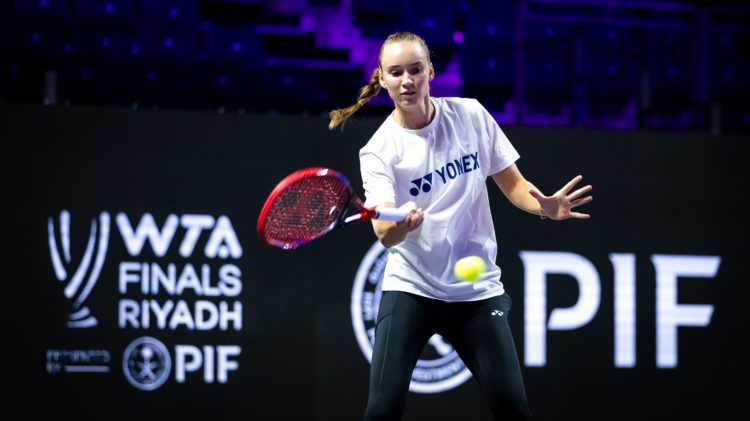
Elena Rybakina is gearing up to compete at the WTA Finals, but her journey to the title won’t be an easy one. As the World No. 5, Rybakina has not played a competitive match since her last appearance at the US Open in August. This extended break from competition could present a significant challenge, particularly at the WTA Finals, where the best players in the world are set to battle it out. With a tournament of this caliber, there is no room for error, especially for those returning from a hiatus.
Aiming to claim her first-ever WTA Finals title, Rybakina finds herself in a particularly challenging group. She’s been placed in the Purple Group, alongside some of the most formidable players on the tour right now. Included in her group is Aryna Sabalenka, the current World No. 1, who has won both the Australian Open and the US Open this year. Also in the group is Qinwen Zheng, the Olympic gold medalist, and Jasmine Paolini, who was runner-up at the French Open and Wimbledon this season.
These players alone present a considerable obstacle for Rybakina, especially given her lack of match practice. Sabalenka, in particular, has been in extraordinary form and comes into the tournament with only one loss since winning the Cincinnati Open. Since then, she has added both the US Open and Wuhan titles to her resume. Zheng has also had a remarkable season, just coming off a victory at the Tokyo Open. In terms of head-to-heads, Rybakina has a combined losing record against both Sabalenka and Zheng, making them the favorites to advance from their group.
For Rybakina, however, this isn’t uncharted territory. The 2022 Wimbledon champion has shown her resilience and ability to adapt under pressure. Despite the stacked odds, she has the powerful serve and aggressive groundstrokes that can make a difference, even against the toughest opponents. However, her lack of recent match experience might affect her sharpness on the court, and this could play a crucial role in high-stakes moments.
### A Closer Look at the Purple Group
Rybakina’s group includes some of the tour’s hottest players, which means there will be no easy matches for her from the start. Aryna Sabalenka, for instance, has been nearly unstoppable in recent months. After her Cincinnati Open win, she’s been on a tear, defeating top players on her way to lifting titles in New York and Wuhan. Known for her powerful shots and competitive mindset, Sabalenka will likely be a significant challenge for Rybakina, especially considering her consistent success on hard courts this season.
Qinwen Zheng is another formidable opponent. Known for her all-around game and impressive speed, Zheng is fresh from her Tokyo Open win, which has boosted her confidence. Her recent results make her one of the most dangerous players in the group, and her relentless energy and strong baseline game will be tough to counter for anyone, let alone a player who hasn’t been on the court in over two months.
Jasmine Paolini, the French Open and Wimbledon runner-up, rounds out the group. While she may not have the big titles that Sabalenka or Zheng do, Paolini is known for her tenacity and ability to adapt. She’s a player who can wear opponents down, and she’s shown that she can take on the tour’s best. Paolini may come in as an underdog, but her fighting spirit and experience this season make her a serious threat.
### Challenges for Rybakina
Rybakina’s time away from the tour could be both a mental and physical challenge. Match fitness is critical in tournaments like the WTA Finals, where every opponent is capable of going deep. The Kazakhstan star will need to adjust quickly to avoid a rocky start, which could be challenging given the pressure of facing top-ranked players from the outset.
That said, Rybakina’s serve remains one of the most effective weapons on the tour, and if she can use it to gain momentum early in points, she’ll have a significant advantage. Additionally, her powerful baseline play can disrupt even the most experienced players. However, the question remains: can she deliver her best without the recent match experience that her opponents have?
### The Orange Group at the WTA Finals
In the other group, known as the Orange Group, the competition is equally fierce. The players include Iga Swiatek, Coco Gauff, Jessica Pegula, and Wimbledon champion Barbora Krejčíková. This group is wide open, with Gauff being the form player coming in after her impressive China Open title and strong run to the Wuhan semi-finals.
Defending champion Iga Swiatek has not competed since the US Open, and she is now working under the guidance of coach Wim Fissette. There’s a possibility that she may lack match sharpness after her break, but she could have the upper hand in terms of experience and mental strength. Swiatek holds a favorable head-to-head record against both Gauff and Pegula, though Pegula did manage to beat her in their most recent clash at the US Open. This dynamic could add an interesting psychological layer to their matches.
Barbora Krejčíková rounds out the group and earned her spot automatically after winning Wimbledon. However, she has been struggling with injuries lately, which could affect her performance. Despite this, Krejčíková has proven time and time again that, when she’s on her game, she has the versatility to challenge anyone in the top ranks.
With top players in both groups, this year’s WTA Finals promises to be one of the most competitive in recent memory. For Rybakina, success in the Purple Group will require bringing her best from the very beginning and taking advantage of her powerful game style to outmaneuver the in-form Sabalenka and Zheng. Should she find her rhythm early, she has the potential to surprise her opponents and make a deep run. But the lack of recent match play may become a factor as she faces opponents who have kept their form intact in recent tournaments.
Leave a Reply